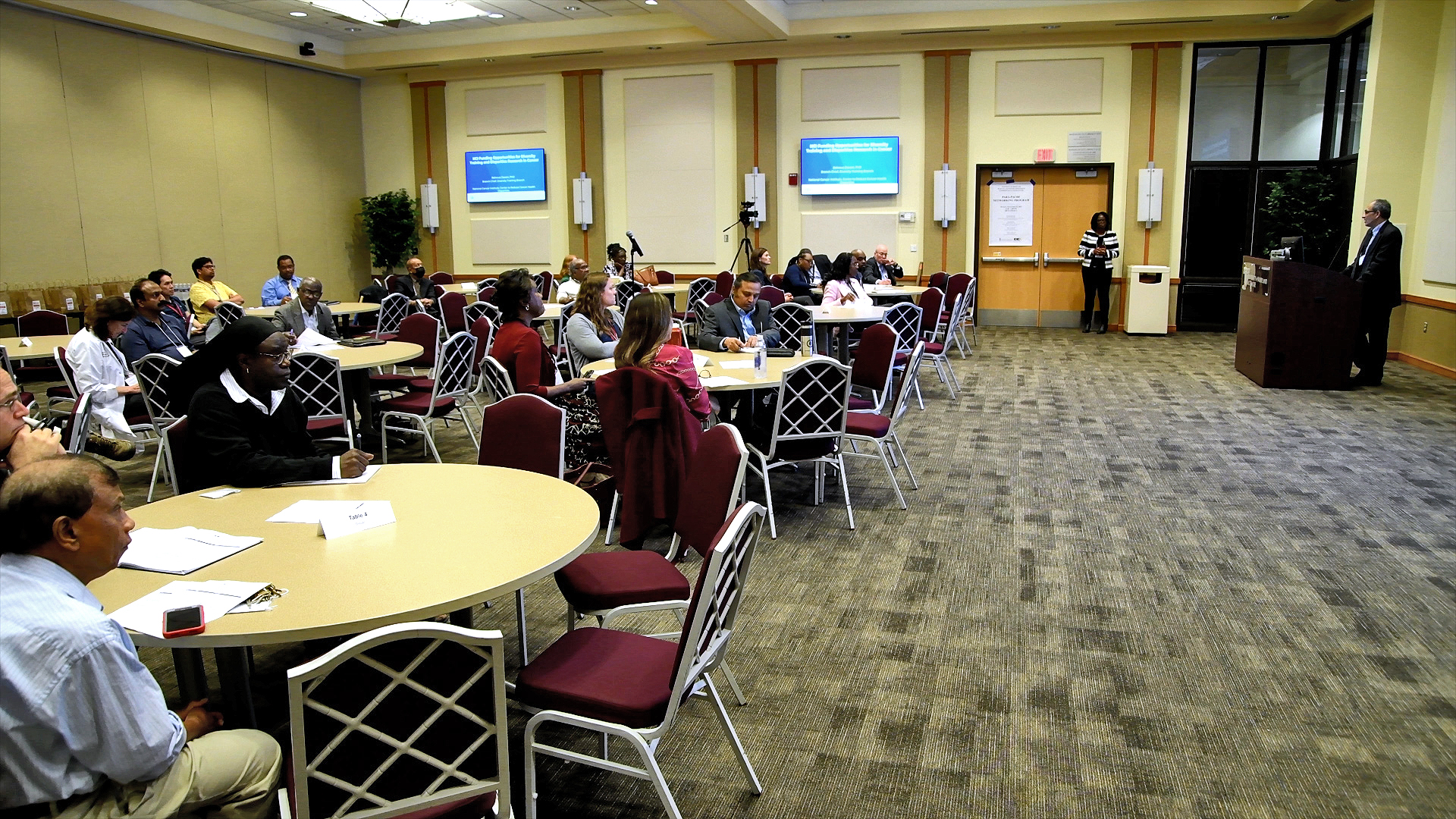Great IDEA: Cancer Center’s Networking Program Fosters Connections
November 01, 2023 University of Maryland Greenebaum Comprehensive Cancer Center IDEA Office
The event was designed to facilitate the development of collaborative research and training initiatives between UMB researchers and local historically Black colleges and universities.
Photo: Attendees listen to a presentation at the University of Maryland Marlene and Stewart Greenebaum Comprehensive Cancer Center’s IDEA Para-PACHE Networking Program in September.
The University of Maryland Marlene and Stewart Greenebaum Comprehensive Cancer Center’s (UMGCCC) IDEA Para-PACHE (Partnerships to Advance Cancer Health Equity) Networking Program aimed to foster connections between researchers at the University of Maryland, Baltimore (UMB) and local historically black colleges and universities (HBCUs).
The event, held Sept. 25 at UMB’s SMC Campus Center, was designed to facilitate the development of collaborative research and training initiatives. The program included presentations, interactive Q&A sessions, and a networking lunch. The primary focus of the event was on topics related to funding opportunities for diversity training and disparities research in cancer, National Institutes of Health (NIH) diversity supplements, and an introduction to the University of Maryland Institute for Health Computing (UM-IHC).
The Speakers
Kevin Cullen, MD, director of UMGCCC, delivered welcoming remarks.
Clement Adebamowo, MD, ScD, associate director of IDEA (Inclusion, Diversity, Equity, and Accesibility), provided an overview of the IDEA Office's objectives and initiatives. The goal of the IDEA Office is to increase the diversity of the UMGCCC research workforce and build a more inclusive, equitable, and accessible community that addresses cancer disparities and advances health. The office implements four aims to achieve this goal:
- Increase the diversity of UMGCCC research workforce by supporting targeted recruitment and implementation of mentorship programs for URM faculty and trainees
- Ensure a more equitable, inclusive, and accessible work environment at UMGCCC that promotes the highest quality of education, training, and research for all.
- Support IDEA culture at UMGCCC through implementation of focused training and communication
- Develop and implement criteria for monitoring and evaluation of the progress of UMGCCC’s IDEA programs
Behrous Davani, PhD, chief of the Diversity and Training Branch of the National Cancer Institute (NCI), delivered a presentation on NCI Funding Opportunities for Diversity Training and Disparities Research in Cancer.
- The Center to Reduce Cancer Health Disparities (CRCHD) is central to NCI’s efforts to reduce the unequal burden of cancer in our society via basic and community research, as well as networks, and to train the next generation of competitive researchers from diverse populations in cancer and cancer health disparities research.
- Initiated in 2001, PACHE is a program that provides institutional awards for the development of partnerships between institutions serving underserved health disparity populations and underrepresented students and NCI- designated cancer centers. Each partnership is expected to conduct cancer and cancer health disparities research, develop, and implement cancer research experiences and research education for scientists and students, and to effectively outreach and disseminate cancer advances to underserved communities. The current Notice of Funding Opportunity is: PAR-23-308.
- Continuing Umbrella of Research Experiences (CURE) is the CRCHD flagship program for training the next generation of cancer researchers.
- Intramural Continuing Umbrella of Research Experiences provides mentored research experiences for undergraduate students, post-baccalaureate and post-masters individuals, graduate students, and postdoctoral fellows).
- The Cancer Moonshot Scholars program is designed to advance cancer science while also diversifying the pool of researchers and the approaches to cancer research that NCI funds. The program seeks to diversify the NCI R01 portfolio by enhancing the number of applications submitted by Early-Stage Investigators from diverse backgrounds. NOFO: RFA-CA-22-050.
- The Early Stage Investigators Program facilitates the advancement of scientists from diverse backgrounds to become independent investigators.
- Professional Advancement Virtual Engagement Seminar provides meaningful career development and resources to support diverse biomedical and social scientists to achieve research independence.
- Collaborative Research Supplements: PAR-22-114: Promotes Cancer Health Disparities research among NCI–funded non-disparity researchers and encourages collaboration with cancer disparities-focused researchers
- CRCHD also supports R03/R21/R01 programs focused on basic cancer health disparities biology:
1. R03: https://grants.nih.gov/grants/guide/pa-files/par-21-324.html
2. R21: https://grants.nih.gov/grants/guide/pa-files/PAR-21-323.html
3. R01: https://grants.nih.gov/grants/guide/pa-files/PAR-21-322.html
Wonder Drake, MD, senior associate dean of faculty affairs, presented relevant mechanisms by which NCI-funded faculty can apply for Diversity Supplements. Most NIH grants, except K awards, are eligible for diversity supplements. Salary support and resources for training are available for trainees, ranging from high school through early career faculty. For more information, please feel free to reach out to Wdrake@som.umaryland.edu.
Bradley Maron, MD, co-director of UM-IHC, delivered a presentation on AI and machine learning in health equity.
- UM-IHC is a new initiative located in Bethesda, Md., that will advance computational sciences to address key unmet clinical needs throughout Maryland, focusing particularly on health equity.
- Data sciences such as AI, machine learning, and network medicine will be used to build solutions to problems across numerous key areas, including population health, pragmatic and community-based clinical trials, and therapeutic target discovery. Education also will be a major focus of UM-IHC, including plans to emphasize entrepreneurship and formal data science certification programs.
- One overarching goal is to build a large-scale Learning Health System that is dynamic and has capacity to improve diagnosis timing and accuracy as well as implement appropriate treatments to patients quickly.
The Attendees
The event had participation from a diverse group of 37 attendees representing various institutions, including UMB, NCI, and local HBCUs such as Morgan State University, Bowie State University, and Howard University.
The Outcome or Impact
The UMGCCC IDEA Para-PACHE Networking Program served as a vital platform for fostering collaborations and knowledge exchange among researchers from different institutions. The overarching goal of this event was to contribute to the successful submission of a CPACHE U54 grant. By bringing together cancer researchers, facilitating discussions on common research interests, and providing insights into funding opportunities, the event strengthened the foundation for future joint research and training programs.